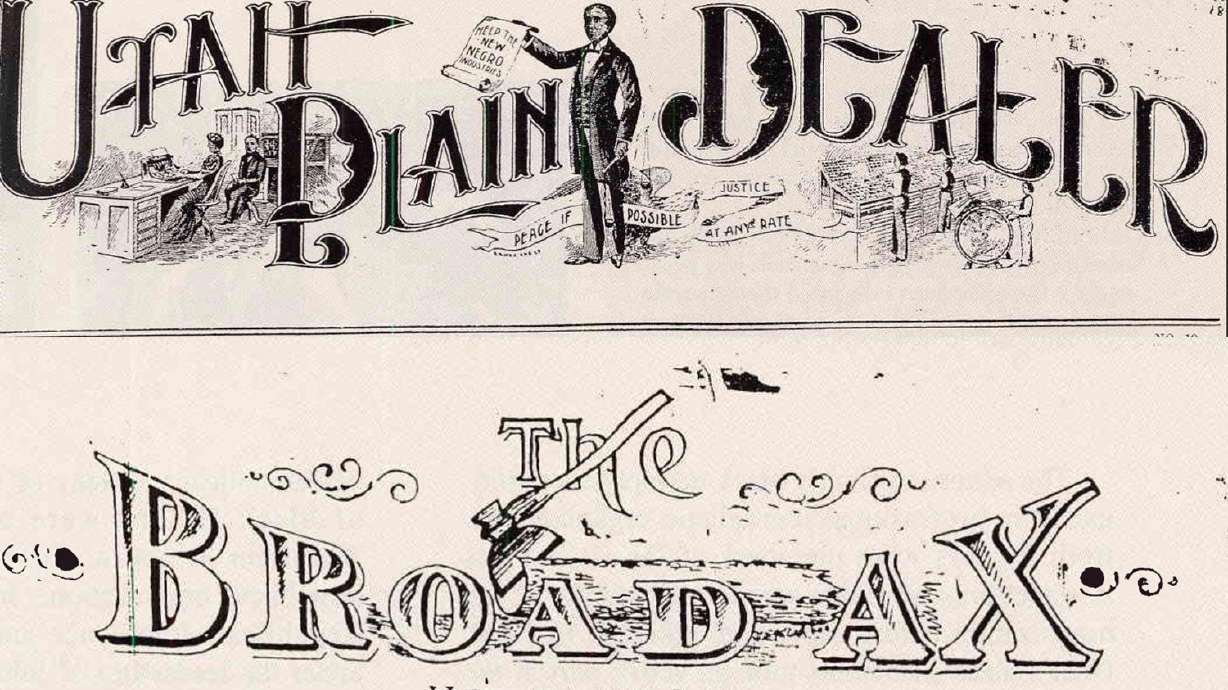Estimated read time: 3-4 minutes
This archived news story is available only for your personal, non-commercial use. Information in the story may be outdated or superseded by additional information. Reading or replaying the story in its archived form does not constitute a republication of the story.
Editor's note:This article is a part of a series reviewing Utah history for KSL.com's Historic section.SALT LAKE CITY — When you think of Utah newspapers, the Deseret News and Salt Lake Tribune obviously come to mind. Of course, there’s plenty of others across the state too.
However, there are many newspapers that played an important role in Utah’s history that no longer exist. That includes six African-American-owned newspapers that existed between 1890 and 1910, according to The Beehive Archive. The Broad Ax and the Utah Plain Dealer are the most recognized of these six.
To be clear, those two newspapers were completely different at the time they existed. Julius Taylor, who ran the Broad Ax, and William Taylor (no relation), who ran the Utah Plain Dealer, appeared to butt heads early and often, according to Jeffrey Nichols, who wrote about the two newspapers for Utah State History. That’s because they were on completely different ends of the political spectrum at the time.
The Broad Ax leaned toward the Democratic Party, while Utah Plain Dealer leaned toward the Republican Party. As Nichols points out, in the 1890s, Democrats were associated with white supremacy (especially in the South) and Republicans were the party that championed emancipation.
William Taylor served as a Salt Lake City tax collector and also ran for state Legislature in 1896, and was also a prominent figure of the city’s black community, which jumped from 588 people in 1890 to close to 1,000 by 1910. He ran the Utah Plain Dealer for at least 12 years, but there isn’t much known about it because only one edition was ever saved.

What is known is that he had a critic in Julius Taylor, whose weekly four-page newspaper pushed commentary on events of the era from 1895 to 1899. His first edition criticized the Utah Plain Dealer and William Taylor, whom Julius Taylor said was unqualified for office, Nichols wrote.
Since very little is known about the Utah Plain Dealer, it’s unclear how William Taylor responded. But he wasn’t Julius Taylor’s only target.
Julius Taylor clashed with the Republican Party, which he argued had betrayed the trust of black voters and promoted the Democratic Party instead.
He was described by one scholar as “a sharp-tongued, Democratic, atheistic, African-American editor in Utah in the 1890s stood out as an anomaly,” according to the U.S. Library of Congress.
He called for better treatment of African-Americans in Salt Lake City and in the U.S. and also feuded with other Utah newspapers, including a spat with Salt Lake Tribune editor C.C. Goodwin, Nichols wrote.
Despite their differences, they were colleagues within the Western Negro Press Association, which William Taylor became president of in 1899, and the Utah Press Association, where Julius Taylor served as the group’s historian at one point, Nichols added.
Julius Taylor eventually moved to Chicago in 1899, where he continued to publish the Broad Ax there. The newspaper went on to blast famous black educator and author Booker T. Washington, and also reported on black lynchings happening in the U.S. while the focus at the time was World War I. It continued until 1931 and Julius Taylor died in 1934, according to the Library of Congress.
There’s no record for when William Taylor died. His wife, Lizzie, continued to publish the Utah Plain Dealer for a time after his death.
Even though they battled each other, Julius Taylor and William Taylor, as well as the four other African-American-owned newspapers, are reminders of the importance of the 1st amendment and the ability they had to project their voices to reach one of Utah’s minority communities.









